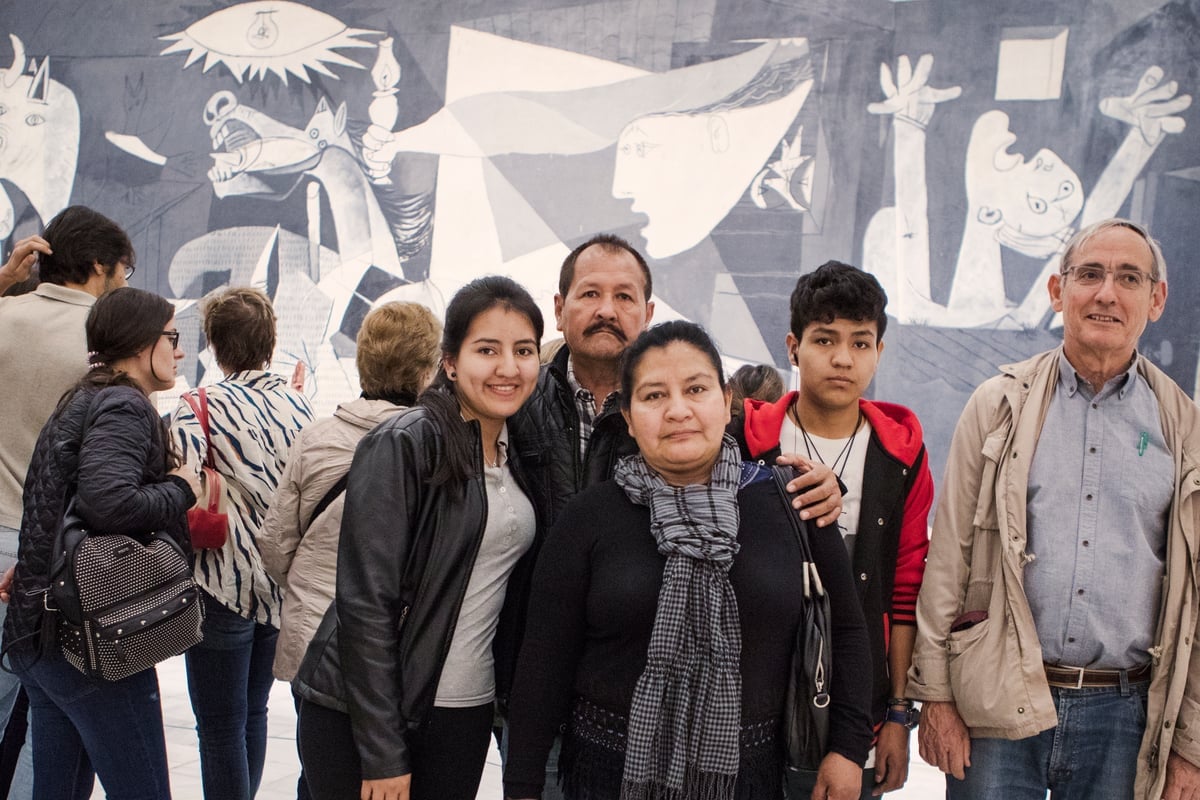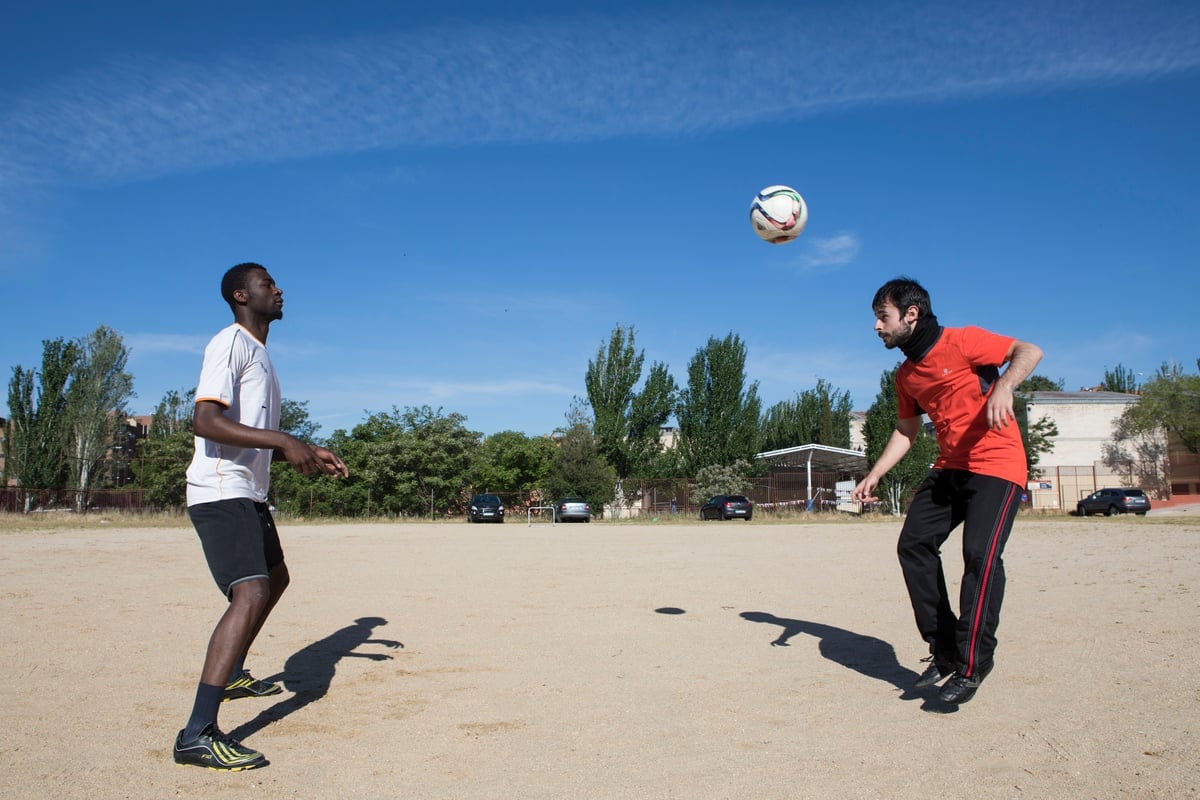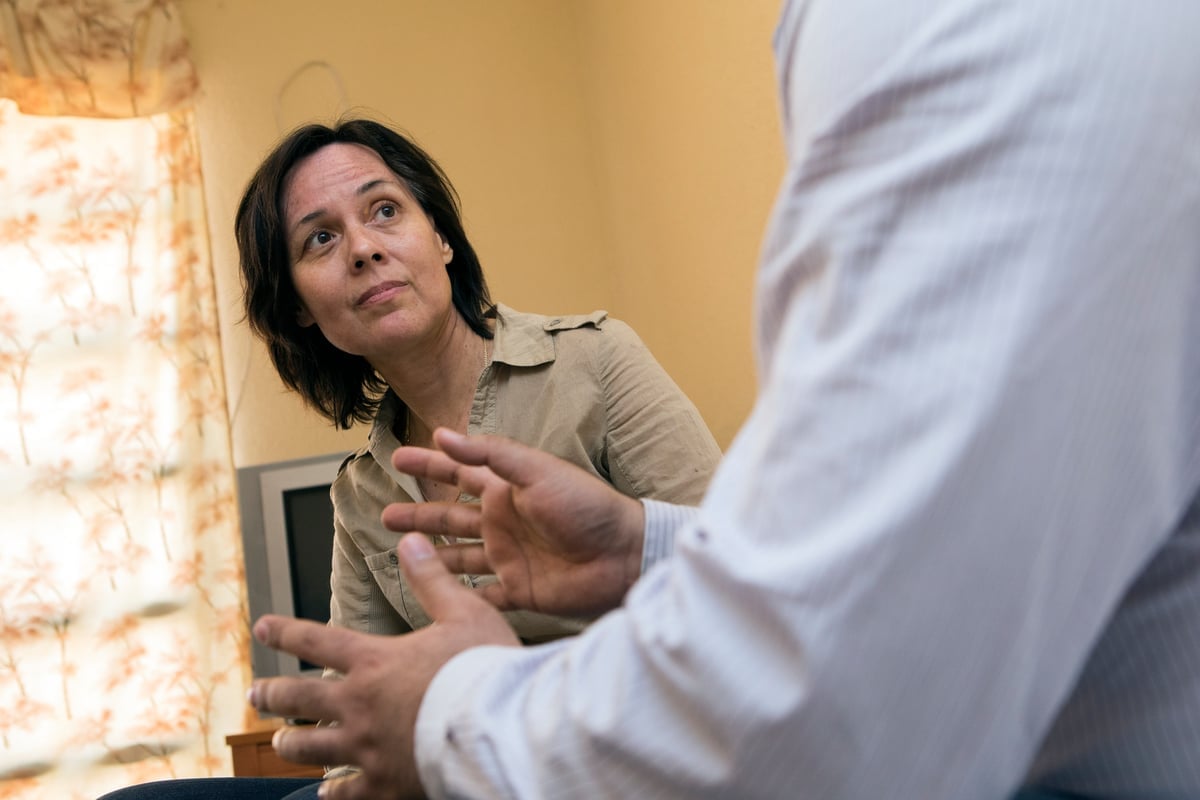Asylum-seekers and hosts bond in Madrid befriending project

Asylum-seekers and hosts bond in Madrid befriending project
Displaced Colombian farmer Nelly Ricaurte stands in front of Picasso’s mural-sized canvas Guernica, depicting terrified figures and animals during the bombing of the namesake Spanish town by warplanes 80 years ago.
Nelly, driven from her own family farm at gunpoint and having witnessed bombings and shootings, immediately feels a connection.
“Reflected in these figures … is what we’ve lived in the flesh,” she whispers in the packed picture gallery. “Even the animals express the pain of that moment,” she adds.
Nelly, her husband José and two of their children are visiting Madrid’s Reina Sofia Museum with José María Zamarrón, a volunteer with a project helping refugees and asylum-seekers to connect with their new lives in Spain.
Set up two years ago by the Spanish NGO Rescate, the befriending programme has so far matched 23 newcomers such as the Ricaurtes from countries as far afield as Colombia, Cameroon and Pakistan, with a network of 60 Madrid residents like José María.
“At various times Spain has produced a lot of refugees of its own, and in Latin America we’ve been welcomed with open arms,” says José María, a retired engineer. “It’s only right that, as human beings, we help each other.”
“It’s only right that, as human beings, we help each other.”
Besides escorting the Ricaurtes to see one of Spain’s most famous artworks at its 80th anniversary showing, he has also taken them to the nearby ski resort of Navacerrada, for their first experience of snow, and helps them with practical tasks such as filling in complex forms or applying for courses.
"It’s fundamental, fundamental,” says José Ricaurte of the help his family receives from José Maria, and a second mentor, Ricardo. “They accompany us … they tell us where to go … and … the guidance that they give us is very important.”
Rescate’s project is supported by UNHCR, the UN Refugee Agency and its National Association, España con ACNUR, which receives donations each month from more than 425,000 people to support UNHCR programmes worldwide. Together they match up each refugee or asylum-seeker referred by social workers with two to four local volunteer mentors, drawn from the list of UNHCR’s supporters.
Among those paired with befrienders is Ismael Ali, 25, who fled the threat of forced recruitment or death at the hands of Boko Haram militants in his home in northern Cameroon.
“When I first arrived … I was lonely … I thought too much, I didn’t have self-confidence,” he says, recalling the desolate early days in Madrid, when he could not speak Spanish and “didn’t have anyone – neither family nor friends”.
Referred to Rescate, he was put in contact with bank investment adviser Gonzalo Fuertes and research student Javier López, whom he now meets regularly for a drink, concerts, movies and scratch games of soccer. A third mentor, Jesús, moved away from Madrid, but they keep in touch through a WhatsApp group they call “amiguetes” – Spanish for “mates”.
“Every day, I thank God for my Spanish friends and the association."
“The idea was to help Ismael to have contact, get to know things and speak Spanish,” says Gonzalo, over a drink and a plate of patatas bravas (spicy potatoes) in a bustling bar in the Madrid suburbs. “We get on really well, we chat, we have a few beers. Ismael’s become just another one of the group.”
Gonzalo and his wife are expecting their first child – a daughter - in a few weeks and he has a new role in mind for Ismael: babysitter. “You’ll come and look after her?” he asks. Ismael smiles broadly. “That works for me!”
“Every day, I thank God for my Spanish friends and the association (Rescate),” he says. “They have given me a lot to keep going.”

This week, UN High Commissioner for Refugees Filippo Grandi echoed these words. Speaking at a conference on refugee reception and integration in Madrid, he thanked Spaniards for their “admirable commitment” to receiving and integrating refugees in their own communities.
“Together with refugees themselves, they make the difference between inclusion or marginalisation, self-reliance or dependency, rebuilding a life or remaining in a situation of loss and despair,” Grandi said.
Openness to helping refugees stems from Spain’s own experience of conflict and displacement in the 1936-39 civil war, some mentors say. Others attribute it to the country’s roots in Catholic, Jewish and Muslim cultures, which has contributed to a deep sense of cultural tolerance.
In a sign of the strength of support for refugees in Spain, Rescate’s befriending programme has been swamped by applications from would-be mentors, with 230 expressions of interest of whom 90 have been selected.
“The take-up has been tremendous, overwhelming,” says Mayra Garcia, a social worker with Rescate, which would like to expand the project to other cities in Spain if they can find the funding. “There’s an ever-growing waiting list, because the project doesn’t have the capacity to respond to everyone.”
"The take-up has been tremendous, overwhelming. There’s an ever-growing waiting list."
The warmth and simple humanity it creates is also valued by Hussain*, a journalist who fled death threats from militants in his native Pakistan three years ago, moving to a blue-collar Madrid suburb with his wife Naseema* and four young sons.
“When we arrived we were totally, totally alone,” he says. “I didn’t even know the word ‘hola’,” although that is now changing.
The doorbell rings and his mentor, Jimena Castaño, arrives. She has hugs and kisses for all the family, and chats in Spanish that Hussain now speaks with ease.
Having a new friend brings buzz, chatter and laughter to the small apartment, and helps fill a void for Hussain, for whom losing his prestigious job, his home and family in Pakistan has been hard.
“Befriending is a good project … A lot of times they have come to my home for dinner with us, and also invited to go to most beautiful places in Madrid,” he says.
For Jimena, an executive personal assistant, getting to know Hussain and his family has also helped her “grow as a person”, she says.
“Doing this sort of thing takes you away from the little things, the daily stuff, and it gives you a lift. It’s given me a lot.”
*Names changed for protection reasons.












